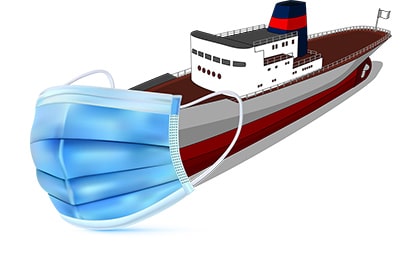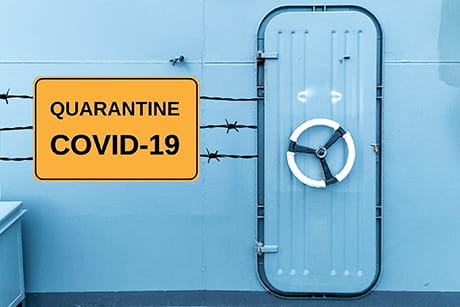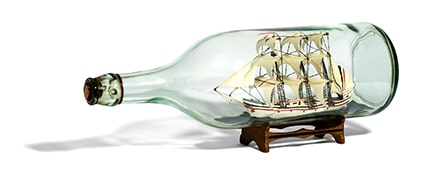Impact of COVID-19 on the Shipping and Maritime Industry
 The outbreak of the infectious disease named as the coronavirus disease (COVID-19) caused by the newly discovered coronavirus has caused chaos and panic all over the world causing the ceasing of all normal daily activities like going to work, a walk outside or in some countries even stepping a foot outside the house. One of the activities that has also been majorly impacted due to the spread of this disease is the shipping and maritime industry. This epidemic has caused the shipping and maritime industry to face the worst circumstances as the workforce in these sectors has been shut down for the safety and prevention of the escalation of COVID-19. This setback has also been caused due to the standstill of all kinds of cargos via water or air during this quarantine period (period of isolation) as the transportation of such cargos in ships or through the air can be possibly carrying with it the virus from one port to another. This widespread pandemic has launched a major brunt for the shipping and maritime industry not only from the ports of China (where the virus is said to originate) but also the ports globally. All the trade chains, including the major import and export trade, is in the face with a downfall. During this adverse time and the urgency of the situation, a ban has also been imposed by various countries on the entry of containers and vessels that are being operated from other ports, especially those that are transported from China. Such impeded operations have hampered with the logistics and operations of these industries. During this adverse time, many workers and staff are being trapped onboard the vessels due to either being in quarantine or for other prescribed safety issues. The ports are also running at a low capacity, and the storage facilities have been highly overcrowded. The maritime transport and shipping industry is plastered with major challenges during these challenging times. Some of these issues faced by the maritime and shipping industry have been outlined below: -
The outbreak of the infectious disease named as the coronavirus disease (COVID-19) caused by the newly discovered coronavirus has caused chaos and panic all over the world causing the ceasing of all normal daily activities like going to work, a walk outside or in some countries even stepping a foot outside the house. One of the activities that has also been majorly impacted due to the spread of this disease is the shipping and maritime industry. This epidemic has caused the shipping and maritime industry to face the worst circumstances as the workforce in these sectors has been shut down for the safety and prevention of the escalation of COVID-19. This setback has also been caused due to the standstill of all kinds of cargos via water or air during this quarantine period (period of isolation) as the transportation of such cargos in ships or through the air can be possibly carrying with it the virus from one port to another. This widespread pandemic has launched a major brunt for the shipping and maritime industry not only from the ports of China (where the virus is said to originate) but also the ports globally. All the trade chains, including the major import and export trade, is in the face with a downfall. During this adverse time and the urgency of the situation, a ban has also been imposed by various countries on the entry of containers and vessels that are being operated from other ports, especially those that are transported from China. Such impeded operations have hampered with the logistics and operations of these industries. During this adverse time, many workers and staff are being trapped onboard the vessels due to either being in quarantine or for other prescribed safety issues. The ports are also running at a low capacity, and the storage facilities have been highly overcrowded. The maritime transport and shipping industry is plastered with major challenges during these challenging times. Some of these issues faced by the maritime and shipping industry have been outlined below: -
I. Port closures
Ports have been closed due to quarantine periods in effect and in order to ensure the well-being of workers and various conditions have been imposed, for instance, the ban of marine vessels into certain countries which has demanded such vessels to be on the water and not have a destination port to go to. The entry of vessels by certain countries has been restricted or prohibited, thus, causing chaos amongst the marine transportation facilities globally.
II. Less demand for cargos
The competent health authorities of every country are avoiding the risk of spreading of COVID-19, which has led to the decline in import and export of products and goods between countries. All such goods that were previously carried conveniently on a ship or any other marine vehicle have to follow a set standard of rules and procedure which has limited the demand for such cargos. The delay in such transportation due to added complications of quarantine periods have led to the further decline of demand for such cargos. Perishable goods are not being able to be transported due to the waiting period of 14 days or the waiting period prescribed by the competent authorities in every country.
III. Disputes between owners and charters
Charters hire the vessels from the owners of the vessels and various kinds of disputes are arising between the owners and charters of such vessels due to loss of time and money. The disputes are arising pertaining to the hire period of such vessels where the charter had been granted such a vessel for a limited period of time; however, such time period being negated due to force majeure.
 IV. Disputes in lay time settlement
IV. Disputes in lay time settlement
The owners grant the vessels to charters for a definite time period for fixed costs. The overriding of such time period leads to additional costs that have to be paid for surpassing the set time period. COVID-19 has imposed major difficulties on the settlement of such time period as the vessels are prohibited from entering certain ports forcing them to be on territorial waters for an extended period of time forcing them to be a party to pay additional costs that are under the light of dispute. Due to force majeure, such costs are not being paid, therefore, causing losses to parties.
V. Discussion on clauses
Every owner of a ship or a vessel is to add an infectious disease clause within its directives and guidelines which is causing a dispute between the owners of the vessels and charters hiring such vessels. Both parties would want to add such clauses advantageous to their own situation or clauses that ensure maximum safety which is leading to disagreements on which clauses to be inserted.
VI. Bankruptcy
Many small companies engaged in the maritime and shipping industry have gone bankrupt due to less demand and the inability to handle the finances of the company during this period of less demand of cargos and shipping. This has majorly impacted the small running businesses and even resulted in the shutting down of various companies engaged in this industry.
Federal Transport Authority in Play
The Federal Transport Authority (FTA) in the United Arab Emirates (UAE) has issued circulars with instructions that mandate various precautionary measures in light of the outbreak of COVID-19 in the maritime and shipping industry. Such instructions dictate the measures and methods to be adopted for containers and vessels that enter through the various waterways and airways in the UAE. Such instructions have been issued to contain the negative effects of this contagious disease and aims to keep the safety of transportation staff and users as the top priority. Such directives include the reduction of the number of staff engaged in such transportation, apply the preventive distancing policy in the public transport means, implement regular plans for disinfecting means of transport and facilities as determined by the competent authorities from time to time, ensure a backup for human resources in case the current staff falls as a victim to the virus so that the continuity of such operations is maintained, organize and establish communication channels within every organization to facilitate the reporting of any symptoms in order to tackle it swiftly in accordance with the procedures of the respective country. Moreover, instructions that have been issued to educate the staff and workers about the crucial and necessary precautions and measures to be taken with regards to their operations in the work environment. All the vital equipment required for the disinfection is also to be delivered and installed and all such disinfection supplies to be distributed amongst the workforce and staff. The transportation facilities would also be disinfected on a timely basis and reduce the staff by launching modern technologies to do the possible work. Priorities are given to seafarers with resident visa who are stuck board the ship vessels, the crew that is longer medically fit to carry out work onboard the ship and crew or seafarers that require urgent medical attention. Some of the other instructions that have been issued by the FTA include the following:
- All the dry docks, ship repair and maintenance workshops are to prevent and ban entry to any ship or marine vessel for any repair, maintenance or repair workshop except under the quarantine rules for the crew of the ship or marine vehicle. Such quarantine period defines that a ship repair or maintenance workshop can be held only after the passage of 14 days from the date of such ship or marine vehicle being located in the last designated port or after the passage of 14 days from the date of the last interaction of the crew of the ship with any person outside the ship or vessel.
- The captain of the ship or the marine vehicle is to inform the competent health authorities in case of any detection of symptoms of COVID-19, and all such information is to be delivered in time in order to avoid penalties.
- The FTA has also stopped the entry of foreign yachts and coordinated with relevant authorities to prevent the issuance of sailing permits.
- All commercial, marine recreational activity and personal pleasure boats have also been suspended during the nation sterilization period with the exception of mountainous areas and islanders that are to use these means only in accordance with the set requirements.
- The work of wooden ships has also been suspended by the FTA, where all such work of wooden ships is banned from entering the waters of UAE and allow only such ships that are loaded with food and fish.
- The wooden ships are to remain in the territorial waters for a maximum period of 7 days in order to prevent mixing with seafarers. All wooden ships that are devoid of prior commercial contracts and are coming for direct shopping from the local market have also been forbidden.
 All such guidelines have been issued by the FTA in order to ensure the implementation of such instructions and the failure of which would lead to applicability of heavy fines on the violators of such instructions. All such instructions are regulated in coordination with the competent authorities and are to be carried out in order to prevent the further spread and outbreak of this infectious disease and in order to ensure the security and safety of the workers engaged in such transportation facilities. Appropriate health scanning and clearance from ports is required before permitting any vessel inside the port of UAE. With the pandemic of COVID-19, the maritime and shipping activity has reduced significantly, and the way to recovery is showing signs of slackening. However, the hopes for recovery exist, and with added precautions and measures being taken, one can positively hope for the restoration of maritime and shipping activities inadequate swing boosting the economy.
All such guidelines have been issued by the FTA in order to ensure the implementation of such instructions and the failure of which would lead to applicability of heavy fines on the violators of such instructions. All such instructions are regulated in coordination with the competent authorities and are to be carried out in order to prevent the further spread and outbreak of this infectious disease and in order to ensure the security and safety of the workers engaged in such transportation facilities. Appropriate health scanning and clearance from ports is required before permitting any vessel inside the port of UAE. With the pandemic of COVID-19, the maritime and shipping activity has reduced significantly, and the way to recovery is showing signs of slackening. However, the hopes for recovery exist, and with added precautions and measures being taken, one can positively hope for the restoration of maritime and shipping activities inadequate swing boosting the economy.
 English
English
 عربي
عربي Русский
Русский 官话
官话 português
português
 Türk
Türk 












